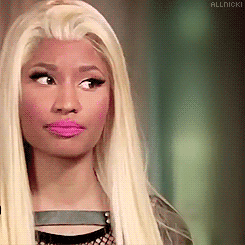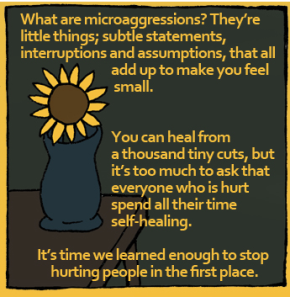 Student staff member, Samiksha Manjani, takes a deeper look at the impact of makeup microaggressions.
Student staff member, Samiksha Manjani, takes a deeper look at the impact of makeup microaggressions.
I normally hate getting ready to go out with girls; or well, I hate putting on my makeup in front of other girls. Instead, I’ll put it on in my own house and then go to my friend’s house to “get ready” aka just to put on a dress. I started to do this after having the same interaction time after time with various friends. It goes something like this:

Me standing in front of the mirror, happily doing my sparkly silver smokey eye, tongue out (because you can never put mascara on with a closed mouth).
“Wow! your eyeshadow looks amazing!”
“Thank you!! I really like smokey eyeshadow looks.” At this point, I’m feeling super awesome about how I’m looking and my makeup when…
“Yeah, I mean, I don’t even know how to put on makeup. I just do whatever, you know. I don’t even wear makeup,” she says dismissively.
Aaaaaand there it is.

Her comment may seem like an honest admission of not knowing how to put on makeup, but it’s not that simple; especially when I’ve gotten similar responses from other girls. If you don’t already know what I’m talking about, allow me to explain: this “compliment” implies that she is somehow better than me because she doesn’t wear or know how to put on makeup; this insinuates that I need makeup because I’m not confident enough to go without it. Simply put, if I wear makeup, I’m not naturally attractive enough.
What makes the situation worse is that, at that moment, I can feel the need to justify myself building up. I know I don’t owe anyone an explanation. I also know that my decision to wear or not to wear makeup doesn’t make me any more or less of a woman, but instead I say,
“Oh, yeah I mean I don’t really know how to put on makeup either. I barely wear it…”
Knowing damn well I’m lying. I didn’t watch countless MUA (“makeup artist”) Instagram and Youtube videos to act like I didn’t know how to put on makeup. Plus, my friend had the sharpest winged eye I had ever seen. How could she say she didn’t know how to put on makeup?

Other times, especially when I’m talking to guys about makeup, they’ll say, “Oh! I like you better without makeup” or “You look better than girls who wear makeup, I don’t like girls that cake on.”
Am I supposed to say thanks?
To be clear, I’m perfectly happy with the way I look when I wear makeup and when I don’t. I don’t think my value is somehow better or worse depending on whether I wear makeup. Likewise, I don’t think I’m suddenly better than other girls because of my decision to wear or not to wear makeup. Some days I just want to sparkle (literally)!
After having the same exact encounter time after time, and being inadvertently shamed for knowing how to do my makeup… I stopped going to get ready at my girlfriends. I stopped feeling comfortable in what was supposed to be an empowering environment.
Why couldn’t I enjoy putting on a full face some days and having a fresh face on others?

It may seem really small or that I’m being overly sensitive, but that’s exactly how microaggressions make you feel. A microaggression is a negative statement directed at a subordinated group; it can be intentional or unintentional. Although microaggressions are essentially micro, their accumulated impact can be quite large (here’s a video to better explain). At the Women’s Center, we like to refer to the impact of microaggressions as a “death by a thousand cuts.” The first time you experience a microaggression, it may not get you down too much, but after hearing either the same one or similar ones so many times, it’ll get to you.
It’s not just the microaggression itself that hurt, the hurt doubled because it was coming from other women. Women that should have been allies. I couldn’t understand,
Why were women perpetuating these unrealistic dichotomies onto each other? Why couldn’t we both be great in whatever we were doing?
I realized that these microaggressions between women were essentially internalized sexism caused by heterosexist patriarchy. Under patriarchal norms, women’s value is dependent on their attractiveness to men. As feminist theorists suggest, when women internalize heterosexist patriarchy and associate their source of worth, identity, and strength with men, they’re compelled to compete with each other for the attention of men. Essentially, we turn on each other when our value is tied to men.

However, we don’t have succumb to it. Maybe instead of feeling intimidated by women who inspire us, we could feel empowered by them.
I recently came upon Shine Theory at the Women’s Center and think it’s a phenomenal way to reframe female competitiveness. Created by Ann Friedman and Aminatou Sow, Shine Theory prescribes that “when you meet a woman who is intimidatingly witty, stylish, beautiful, and professionally accomplished, befriend her.”’ Friedman and Sow contest that “surrounding yourself with the best people doesn’t make you look worse by comparison. It makes you better.”
When we apply Shine Theory to the makeup debacle, we can acknowledge if our friend is better at something than us, but also that it doesn’t reflect a deficit in ourselves. Maybe I did know how to do a smokey eyeshadow look when my friend didn’t, and that doesn’t mean I have to use makeup to feel more attractive. Likewise, her decision to not wear makeup doesn’t mean that she is inherently more attractive, valuable, or confident than me. Wearing makeup skillfully doesn’t add or detract value from a person. It just means you wear makeup.
So the next time you’re around a powerful woman that you perceive is rocking something better than you, befriend them instead of feeling self-conscious.

